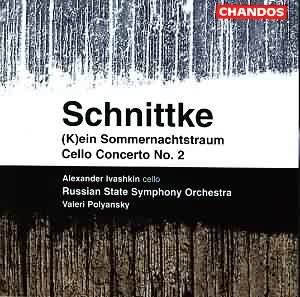
Schnittke's concerto is blackly and bleakly rhapsodic with a pretty assertive
vein of dissonance. Alexander Ivashkin's flammable playing reminded me of
the young Arto Noras (his Sallinen, Kokkonen and Bliss performances are
treasure-house material). One cannot help but be impressed. In addition Ivashkin
also wrote the liner notes.
The concerto is a disquieting nightmare. Notable snapshots include the abrasive
ghoulish whinnying of the cello at 1:22. A hair-raising sound. The cello
is recorded very forwardly. I would have liked a more commanding presence
for the orchestra especially as it positively heaves with detail. The
slow-stepping grave is overwhelming and Schnittke's beloved harpsichord puts
in an appearance here. The final passacaglia is longest of the five movements
at 16.05 and draws on a theme from his music for the film Agony. The
film score is recorded on OLYMPIA OCD606 and is well worth seeking out
(Schnittke's film music is not to be dismissed). All in all, in this concerto,
Schnittke beats the Scandinavians at the gloom game. This is a depressive
compelling whirlpool of a work.
The brief Sommernachtstraum's dislocated clockwork rains down dissonant
drifts of notes. This is Mozart (often unfiltered) slipping backwards and
forwards in time, melting through mirrors and windows and lost in some crazed
inner-world circus.
The element of dissonance is strong in these works but an underlying sense
of melody is never far away.
Articulate music meet for hardier ears ready for a challenge.
Reviewer
Rob Barnett

and another view from Peter Grahame Woolf
This huge and important cello concerto (1990) is in five movements, the slow
finale more than a quarter of an hour long. It is full of conflict, with
massive orchestral climaxes, characterised in the soloist's interesting liner
notes as a prolonged fight, with confrontations between hero and mob, etc.
Very dramatic and gripping music, pessimistic in feel - it ends with the
soloist playing in a high register until he becomes inaudible, "killed" by
the orchestra, it may be thought.
Impressive, strong playing, totally committed. The orchestra is the former
Soviet Philharmonic Orchestra which had been formed by Rozhdestvensky, the
present conductor in post since 1992. They have made many records of Schnittke's
music for Chandos.
The fill-up (Not) A Midsummer Night's Dream (1985) starts with a delicious
conceit, a sweet little Mozartian tune for violin and piano, the violinist
specified to be at the back desk of the second violins, giving food for thought
about the orchestral life and a moment of glory for the lucky player. to
be played by with comes as a welcome relief, but beware, you have been warned
- this is Schnittke! It all gradually curdles, proliferating polyphonic lines
develop in the composer's polystylic manner and you are taken for a ride
into strange, disturbing and sometimes banal territory with fairground music
and a catastrophic climax with massive orchestral dissonances, all built
upon the original little tune which is never far away. Some of this reflects
Mahler's way with popular ingredients in his symphonies, but Schnittke has
his own bitter, ironic flavour. Back afterwards to the innocent tune in simple
C major and the nightmare is over, all in 10 minutes. This is a great piece
to play to unsuspecting friends without advance warning what it is.
Reviewer
Peter Grahame Wolf

P.S. I agree with Rob Barnett that the cello is too forward in the Chandos
recording of the Schnittke 2nd Concerto; there is a more natural balance
in the BIS version (Thedéen/Malmö S.O. on BIS CD-567) which is
coupled with the far more substantial Concerto Grosso No 2, 32 mins. The
BIS series, recorded with the composer's involvement, is indispensable.
(Not) A Midsummer Night's Dream is included with Ritual, Passacaglia
and the Faust Cantata. All the BIS CDs are highly recommendable.

Peter Grahame Woolf
